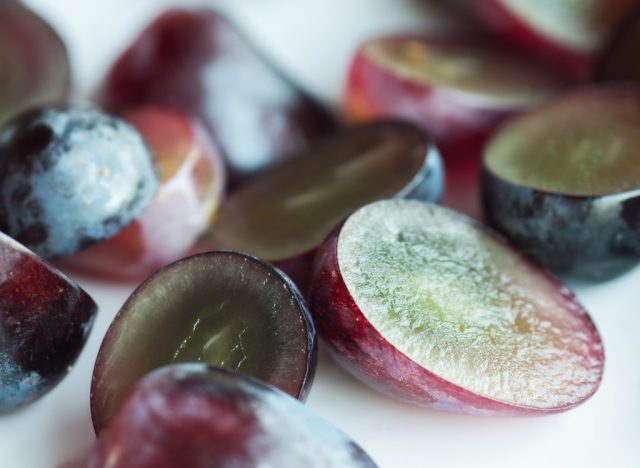
Grapes are packed with many beneficial nutrients. This fruit comes in literally thousands of different varieties and colors, all of them delicious in their own unique way—but are grapes good for you? Experts say there are both pros and cons to munching on bunches of grapes every day, but do the benefits of eating grapes outweigh the possible side effects?
Incredibly versatile, grapes are some of the most convenient yet nutritious foods around. They are a good source of vitamin K, containing over 18% of your daily recommended intake per cup of the bone health-supporting nutrient, as well as being low in fat, sodium, and cholesterol. They're also about 84% water, which means you get an instant dose of hydration from munching on them. You can eat grapes right off the vine, incorporate them into smoothies, toss them into salads, or even freeze them for a popsicle-like treat. Despite their convenient portability and a bevy of possible health benefits, in some cases, grapes may also do more harm than good if you go overboard while snacking on them—which, let's be honest, is pretty easy to do.
While this fruit is a mess-free treat that tastes as sweet as candy, the sweet flavor of grapes results from their naturally high sugar content. Additionally, grapes can contain a lot of carbs while also lacking satiating protein. For instance, a 1-cup serving of grapes delivers about 23 grams of sugar, 27 grams of carbs, and only a measly 1 gram of protein. In other words, it's easy to get carried away devouring grapes by the handfuls, and the amount of sugar and carbs you consume while noshing on grapes by the bunches can add up quickly.
At the same time, registered dietitian Shirlene Reid, MA, LD, RD, says that grapes (like any other fruit) are generally considered to be a healthy option to eat—as long as they're consumed in moderation. (Pro-tip: For better portion control with grapes, it may be helpful to portion out this serving size in a plastic bag to avoid the temptation of getting carried away.)
To get a better sense of the impact of the benefits versus the side effects of eating grapes on your overall health and wellness, let's first turn to the fundamental nutrition content of grapes.
A Look at the Nutrition Info for Grapes

Before diving into how eating this tiny fruit can potentially affect your body and overall health in the short and long term, it's important to understand how the nutrition profile breaks down for grapes. According to the USDA, one cup of seedless grapes, whether green or red, amounts to:
- 104 calories
- 1.1 grams protein
- 0.2 grams fat
- 27.3 grams carbs
- 1.4 grams fiber
- 23.4 grams sugar
- 4.83 milligrams vitamin C (5% DV)
- 0.13 milligrams vitamin B6 (8% DV)
- 22 micrograms vitamin K (18% DV)
- 288 milligrams of potassium (6% DV)
So, are grapes good for you? To help us untangle this vine, we assess the science behind some of the benefits and side effects that are associated with eating grapes. Keep reading to discover what might happen to your body when you eat a bunch of grapes.
8 BENEFITS OF EATING GRAPES
Grapes are linked to longevity and youthful appearance.

Looking to keep your health and external appearance in tip-top condition as you age? Then consider packing some grapes in your work lunch bag! Though more research is needed, the implications of many animal studies suggest that eating more grapes might just help extend your lifespan while also maintaining your youthful glow well into your golden years. This is because grapes contain resveratrol, a natural antioxidant that can deter signs of aging by reducing oxidative stress, minimizing inflammation, and supporting cellular processes that help regulate aging and cell death. Resveratrol is also linked to improved skin quality and may even help support hair growth.
They can help reduce inflammation.

"Chronic inflammation has been linked to cancer, heart disease, Alzheimer's, type 2 diabetes, arthritis, and other serious conditions. Fortunately, grapes are brimming with antioxidants like vitamin C, vitamin K, polyphenols, catechins, and anthocyanins—all of which can help reduce inflammation," says Jesse Feder, RD, a registered dietitian and personal trainer with Strength Warehouse.
"Additionally, grapes—especially red ones—are known to be rich in resveratrol," says Feder. Resveratrol is known to help protect against inflammation. Specifically, resveratrol provides a protective lining for blood vessels to prevent injury, thereby warding off heart inflammation. Studies have even found that taking grape powder extract can increase the levels of anti-inflammatory compounds in your blood.
They can boost your immune system.

Grapes are a stellar source of vitamin C; one cup of grapes amounts to over 5% of your recommended daily value of this vitamin. As you may or may not know, vitamin C is an essential nutrient that benefits your immune system, which may explain why test-tube studies have shown that grape skin extract can protect against the flu virus. In fact, 2013 research comparing the immune-boosting effects of hundreds of foods found that red grapes stood out—mainly due to the resveratrol in grapes, which also works with vitamin D to raise the expression of a specific gene involved in immune function.
Grapes may reduce your risk of heart disease.

One cup of grapes contains an impressive 288 milligrams of potassium, which plays a key role in lowering blood pressure. Not only that but studies have shown that red grapes contain compounds that may help to reduce total and "bad" LDL cholesterol.
"The polyphenols in grapes have been shown to lower the risk of atherosclerosis (hardening of the arteries)," says certified nutritionist Paul Claybrook, MS. "They do this, of course, by eliminating free radicals but also improve the function of the tissues and help avoid LDL cholesterol from being damaged and sticking to blood vessel walls. They also help maintain the elasticity of blood vessels, thus reducing blood pressure and [keeping] platelets from sticking together and creating clogs."
They support your cognitive health.

Studies have shown that eating grapes doesn't just support your physical health, but also your cognitive health, too.
"Grapes improve memory and focus," says Danielle McAvoy, RD, with Strong Home Gym. "The antioxidant compounds in grapes help minimize oxidative stress in the brain, which can protect your brain from cognitive decline and memory loss as you age." In fact, one 2017 study found that when adults took a grape supplement daily, they improved their test scores for attention, memory, and language.
"Grapes can also improve blood flow to the brain, thus improving your daily focus," adds registered dietitian Melissa Mitri, RD.
Studies have shown that resveratrol, a specific antioxidant found mainly in the skin of grapes, helps reduce your risk of Alzheimer's by lowering inflammation in the brain and also getting rid of the amyloid-beta peptide, which has been linked to the progression of this disease when it accumulates.
Your blood pressure may improve.

When high blood pressure is left unchecked, it can increase your risk for the two leading causes of death in America: heart disease and stroke. But the good news is that there are plenty of diet-related ways to help manage and prevent high blood pressure, including snacking on grapes. According to McAvoy and Mitri, eating grapes can help balance blood pressure because they're high in potassium and low in sodium. As the CDC notes, too much sodium can raise blood pressure. However, a 2016 study in Nutrients illustrates how potassium helps lower blood pressure by helping to dilate veins and arteries while also flushing out excess sodium.
They promote cell damage repair and shield against free radicals.

Antioxidants are powerful substances that defend your body from free radical damage, and grapes are chock-full of them! These antioxidants help protect and repair your cells from oxidative stress—which is linked to the development of chronic diseases like cancer, heart disease, and diabetes.
"Oxidative stress simply means that there are too many free radicals (waste products) and not enough antioxidants (waste neutralizers) in your body to mop them up," explains Claybrook. "The result is damage to tissues that can lead to disease. Fortunately, grapes contain tons of antioxidants, including flavonoids, phenolics, vitamin C, quercetin lutein, beta carotene, and resveratrol."
Research has revealed that grapes contain over 1,600 beneficial plant compounds, and since the highest concentration of antioxidants is in the seeds and the skin, it's better to eat them whole than simply drink grape juice. Additionally, it's also worth noting that red grapes are higher in antioxidants than green ones because they contain anthocyanins, a type of flavonoid that's responsible for their color.
You might get a better night's sleep.

"Grapes are a great evening snack because they can help you drift off and catch some quality Zzzs," says McAvoy. Why? Because this fruit contains a small amount of melatonin, the hormone that helps regulates your body's sleep-wake cycle. Try eating grapes an hour or two before bedtime. And remember, be mindful of your portion size or you might accidentally overload on sugar, which can interfere with the quality of your sleep.
3 NEGATIVE SIDE EFFECTS OF EATING GRAPES
Your poop may change colors.

If you notice that your stool looks a little off-color after using the bathroom, this may be an alarming cause for concern at first—especially if that color is a greenish hue. However, if you also know you recently ate a bunch of green grapes, there's no need to panic and start doom-scrolling through WebMD! The grapes you ate before could be the culprit behind your green poop.
"The color of your poop can be influenced by various factors, including the food you eat. Green-colored poop after eating green grapes can be attributed to a natural pigment present in grapes called chlorophyll," explains Mary Sabat MS, RDN, LD. "Chlorophyll is responsible for the green color in plants and can sometimes pass through your digestive system without being fully broken down. When you consume green grapes or any other food containing chlorophyll, some of it may remain undigested and give your stool a greenish tint."
They may upset your stomach.

"While grapes are very healthy, too much of a good thing can still be a problem," says Claybrook.
If you've ever lost track of how many grapes you've eaten—which, let's face it, is all too easy to do—you may experience a tummy ache. According to Reid, this usually happens because of the high amounts of fructose in grapes (about 12.3 grams per cup).
"Fructose is a natural sugar found in fruits that can cause gas when consumed in high amounts," says Reid. "So, when you eat too many, you may get stomachaches due to the gas. Tannins in grapes, which are found in the skin and seeds, may also play a role in an upset stomach because these naturally occurring polyphenols can cause nausea and diarrhea if eaten in high amounts."
Mitri adds that some people who are particularly sensitive to these compounds in grapes may experience bloating, constipation, or diarrhea after eating too many.
Your blood sugar might rise.

Grapes pack a whopping 23.4 grams of sugar per cup. They also contain resveratrol, which research shows may increase insulin sensitivity, thus having a beneficial effect on your blood sugar levels. Studies even say that controlling this hormone may help lower blood sugar.
However, Claybrook notes that this fruit is relatively low on the glycemic index, meaning they shouldn't cause your blood sugar to spike too much—if you eat them in moderation.
"Your blood sugar will increase but not as significantly as something like soda would cause," he explains. "Part of the reason for this is that grapes contain some fiber, which slows down the speed at which your body can absorb nutrients, including sugar. There isn't a whole lot of fiber (just under a gram per cup), but it's enough to keep your blood sugar in a reasonable range as long as you aren't pigging out on them."
No comments:
Post a Comment